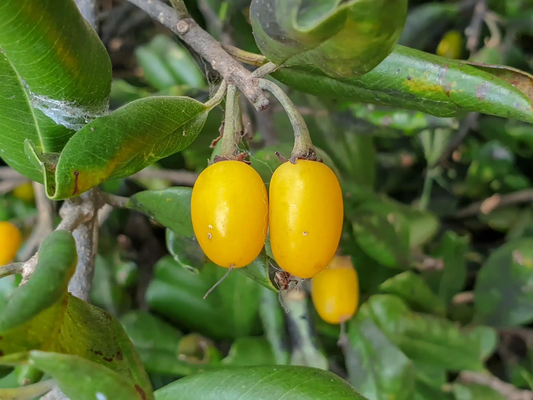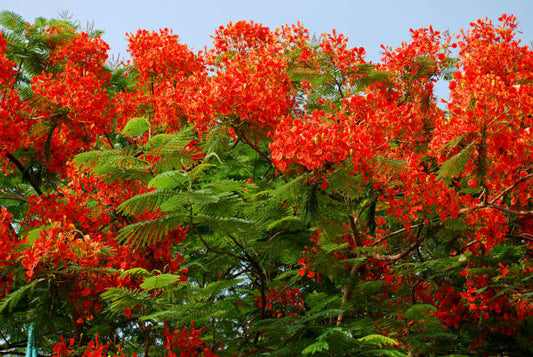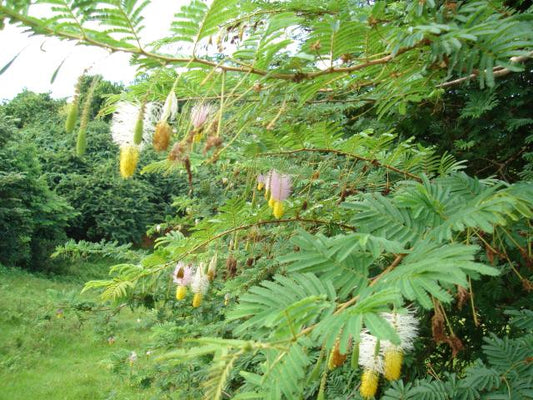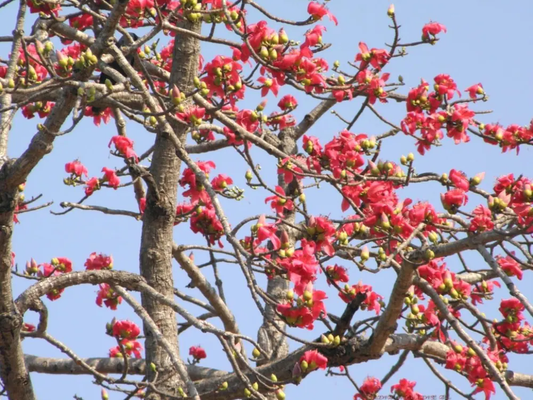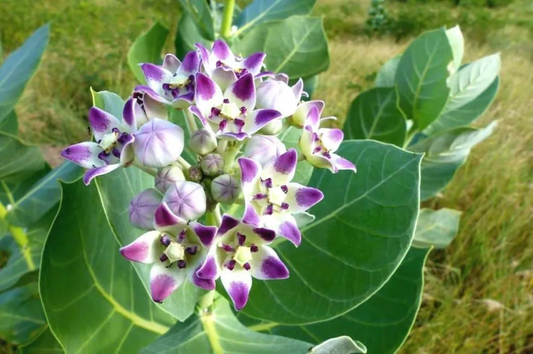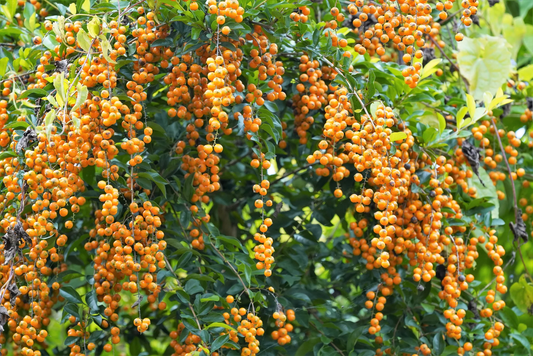

Amla, also known as Indian gooseberry, is one of the richest natural sources of Vitamin C, containing more Vitamin C than oranges. Taxonomy and Botanical Features: Amla, scientifically known as Phyllanthus emblica, belongs to the family Phyllanthacea Read more
Trending
Trees for Corporates
Amla Tree: Environmental Impact and Sustainable Cultivation
Amla, also known as Indian gooseberry, is one of the richest natural sources of Vitamin C, containing more Vitamin C than oranges.
Taxonomy and Botanical Features: Amla, scientifically known as Phyllanthus emblica, belongs to the family Phyllanthaceae. It is a small to medium-sized deciduous tree native to the Indian subcontinent. The tree typically reaches heights of 5 to 20 meters, with a spreading crown and thin branches. Amla leaves are simple, narrow, and light green in color, while its small, pale green flowers bloom in clusters. The fruit of the Amla tree is spherical, greenish-yellow in color, and has a sour taste.
Historical and Cultural Significance: Amla has a rich history of use in traditional Indian medicine systems such as Ayurveda and Siddha. It has been revered for its health-promoting properties for thousands of years and holds a significant place in Indian culture and folklore. In ancient texts like the Charaka Samhita and Sushruta Samhita, Amla is described as a powerful rejuvenating herb that enhances longevity and vitality. Additionally, Amla is considered sacred in Hinduism and is often associated with deities like Lord Vishnu and Goddess Lakshmi.
Medicinal Properties and Traditional Uses: Amla is renowned for its diverse medicinal properties and is used in various forms to treat a wide range of ailments. It is valued for its high content of Vitamin C, which boosts immunity and enhances the body's ability to fight infections. Amla is also rich in antioxidants, which help protect cells from damage caused by free radicals and oxidative stress. In traditional Ayurvedic medicine, Amla is used to treat digestive disorders, respiratory problems, and skin conditions. It is also believed to promote hair growth, improve eyesight, and strengthen the cardiovascular system.
Agricultural Applications: Amla cultivation is an integral part of agriculture in India, with the fruit being grown commercially in various states across the country. Amla trees are typically planted in well-drained soil with proper irrigation facilities. The fruit is harvested when fully ripe and is either consumed fresh or used to make various products such as pickles, jams, and juices. Amla cultivation provides livelihood opportunities for farmers and contributes to rural economic development.
Modern Scientific Research: Recent scientific studies have validated many of the traditional uses of Amla and have uncovered new potential health benefits. Research has shown that Amla extract exhibits anti-inflammatory, antimicrobial, and anticancer properties. It has also been found to have hypoglycemic effects, making it beneficial for managing diabetes. Furthermore, studies suggest that Amla may help reduce cholesterol levels, improve liver function, and protect against age-related cognitive decline.
Environmental Impact and Sustainability: Amla cultivation is environmentally friendly and sustainable, as it requires minimal inputs and has a low carbon footprint. Amla trees help improve soil fertility and structure, prevent erosion, and conserve water resources. Additionally, Amla orchards provide habitat for birds and other wildlife, contributing to biodiversity conservation. Sustainable practices such as organic farming and agroforestry further enhance the environmental benefits of Amla cultivation.
Economic Importance: Amla has significant economic importance in India, both domestically and internationally. The fruit is in high demand in the food and beverage industry, with Amla-based products such as juices, candies, and dietary supplements gaining popularity worldwide. Amla cultivation also generates income for farmers, traders, and exporters, contributing to rural livelihoods and national GDP. Furthermore, the growing awareness of Amla's health benefits has led to increased consumer demand, creating opportunities for value-added processing and marketing.
Conservation Status and Future Prospects: Amla trees are not considered endangered, and their conservation status is generally stable. However, sustainable management practices are essential to ensure the long-term viability of Amla cultivation. Conservation efforts should focus on preserving genetic diversity, promoting organic farming practices, and supporting small-scale farmers. Additionally, research and innovation in Amla cultivation techniques and product development can help enhance productivity, quality, and market competitiveness. Overall, Amla holds immense promise as a versatile crop with significant health, economic, and environmental benefits. Continued investment in Amla cultivation and value chain development can contribute to sustainable development and improved well-being for communities worldwide.
Conclusion: In conclusion, Amla is a remarkable fruit with a rich history, diverse medicinal properties, and significant cultural and economic importance. From ancient Ayurvedic texts to modern scientific research, Amla has stood the test of time as a symbol of health, vitality, and holistic well-being. As we look to the future, Amla holds immense potential to promote human health, support sustainable agriculture, and foster environmental conservation. By harnessing the power of Amla and investing in its cultivation and utilization, we can create a healthier, more resilient, and more prosperous world for generations to come.
- Wikipedia: Saraca asoca - https://en.wikipedia.org/wiki/Saraca_asoca
- Ministry of Agriculture and Farmers Welfare, Government of India: http://www.agriculture.gov.in/
- Indian Council of Agricultural Research (ICAR): http://www.icar.org.in/
- National Medicinal Plants Board (NMPB): http://www.nmpb.nic.in/
You may also like
Corporate Plantations
Amla Hair Oil
Indulge your tresses with the nourishing goodness of Amla hair oil! Known for its hair strengthening properties, Amla oil promotes hair growth, prevents premature greying, and nourishes the scalp. Say goodbye to dull, lifeless hair and hello to luscious locks with Amla hair oil.
Amla Capsules
Experience the convenience of Amla capsules for daily health support! Packed with the goodness of Amla extract, these capsules are a convenient way to boost immunity, support digestion, and promote overall well-being. Incorporate Amla capsules into your daily routine and unleash the power of nature's wellness elixir.
Amla Candy
Treat your taste buds and nourish your body with Amla candy! Bursting with tangy flavor and nutritional benefits, Amla candy is a delightful way to enjoy the goodness of this superfruit. Rich in Vitamin C and antioxidants, Amla candy offers a sweet and sour indulgence with every bite.
Amla Pickle
Spice up your meals and boost your health with Amla pickle! Made from fresh Amla fruits marinated in a blend of spices and oils, Amla pickle is a flavorful addition to any dish. Enjoy the tangy taste and reap the health benefits of Amla's antioxidant-rich goodness.
Amla Tea
Warm up and rejuvenate your senses with Amla tea! Infused with the zesty flavor of Amla, this herbal tea is a soothing blend of health and taste. Sip on Amla tea to boost immunity, aid digestion, and relax your mind after a long day. Experience the comforting embrace of Amla tea and feel revitalized from the inside out.
Amla Chutney
Elevate your meals with the flavorful kick of Amla chutney! Made from fresh Amla fruits blended with spices, herbs, and a hint of sweetness, Amla chutney adds a burst of flavor to any dish. Enjoy the tangy and spicy notes of Amla chutney while reaping its nutritional benefits.
Amla Face Mask
Pamper your skin with the rejuvenating properties of Amla face mask! Enriched with Vitamin C and antioxidants, Amla face mask helps brighten complexion, reduce dark spots, and tighten pores. Treat yourself to a spa-like experience at home and unveil radiant, glowing skin with Amla face mask.
Amla Shampoo
Revitalize your hair and scalp with Amla shampoo! Infused with the goodness of Amla extract, this nourishing shampoo strengthens hair, promotes growth, and prevents dandruff. Say goodbye to dry, brittle hair and hello to silky-smooth strands with Amla shampoo.
Amla Seed Oil
Harness the power of Amla seed oil for skin and hair care! Cold-pressed from Amla seeds, this versatile oil is rich in essential fatty acids and antioxidants, making it an ideal moisturizer for dry skin and a potent hair treatment for nourishing and strengthening hair follicles. Incorporate Amla seed oil into your beauty routine and unveil healthy, radiant skin and hair.
Amla Jam
Sweeten your day with the delectable taste of Amla jam! Made from ripe Amla fruits cooked with sugar and spices, Amla jam is a delightful spread for toast, sandwiches, and desserts. Indulge in the rich flavor and nutritional benefits of Amla jam as part of your daily breakfast or snack time routine.
FAQ
What are the health benefits of consuming Amla?
Amla, also known as Indian gooseberry, is a powerhouse of nutrients. It is rich in Vitamin C, antioxidants, and minerals, which help boost immunity, improve digestion, promote hair health, and enhance skin complexion. Regular consumption of Amla can also aid in weight management, regulate blood sugar levels, and support heart health.
How can Amla be consumed?
Amla can be consumed in various forms, including raw, juiced, dried, or as supplements like capsules or powders. It is commonly used to make jams, pickles, chutneys, candies, and juices. Amla-based products like hair oils, shampoos, and face masks are also popular for their health and beauty benefits.
Is Amla safe for everyone to consume?
Amla is generally safe for most people when consumed in moderate amounts as part of a balanced diet. However, individuals with specific medical conditions, such as kidney stones or acid reflux, should consult their healthcare provider before consuming Amla supplements or extracts.
Can Amla help with hair growth?
Yes, Amla is known to promote hair growth and prevent hair fall. It strengthens hair follicles, stimulates hair growth, and prevents premature greying. Applying Amla oil or consuming Amla supplements regularly can help improve hair health and texture.
What are the culinary uses of Amla?
Amla is a versatile ingredient in Indian cuisine. It is used to make chutneys, pickles, jams, candies, and juices. Amla is also added to curries, rice dishes, and desserts for its tangy flavor and nutritional benefits. Additionally, Amla powder is used as a natural preservative in cooking.
Is Amla beneficial for skin health?
Yes, Amla is beneficial for skin health due to its high Vitamin C content and antioxidant properties. It helps reduce oxidative stress, fight signs of aging, and improve skin complexion. Applying Amla-based face masks or consuming Amla supplements can help achieve healthy and radiant skin.
How does Amla support digestive health?
Amla aids digestion by stimulating the secretion of digestive enzymes and regulating bowel movements. It helps relieve constipation, indigestion, and bloating. Consuming Amla regularly can promote gut health and improve overall digestive function.
Can Amla be consumed during pregnancy?
Pregnant women can safely consume Amla in moderate amounts as part of a balanced diet. It provides essential nutrients like Vitamin C, folate, and iron, which are beneficial for maternal and fetal health. However, it is advisable to consult a healthcare professional before adding Amla supplements to the diet.
Does Amla have any anti-inflammatory properties?
Yes, Amla exhibits anti-inflammatory properties due to its high antioxidant content. It helps reduce inflammation, alleviate pain, and promote healing in various inflammatory conditions such as arthritis, gastritis, and respiratory infections.
How does Amla contribute to heart health?
Amla supports heart health by reducing cholesterol levels, lowering blood pressure, and improving blood circulation. Its antioxidant and anti-inflammatory properties help protect the cardiovascular system from oxidative stress and inflammation, reducing the risk of heart disease and stroke. Regular consumption of Amla can contribute to a healthy heart and overall well-being.
Is Amla beneficial for diabetic individuals?
Yes, Amla can be beneficial for diabetic individuals as it helps regulate blood sugar levels. It contains polyphenols and flavonoids that improve insulin sensitivity, enhance glucose uptake by cells, and reduce postprandial blood sugar spikes. Including Amla in the diet may help manage diabetes and prevent complications associated with the condition.
Are there any side effects of consuming Amla?
In general, Amla is safe for most people when consumed in moderation. However, some individuals may experience side effects such as acid reflux, stomach upset, or allergic reactions. It is important to consume Amla within recommended limits and consult a healthcare professional if any adverse reactions occur.
Most Popular
Connect with us
-
👥 Corporates
If you are looking for:
- 🌲 Tree Plantation Events
- 📊 CSR Projects
📧 corporate@growbilliontrees.com
📞 +91 9699723523
💬 +91 9370599291 WhatsApp (Only)
🕒 Mon - Sat | 10am - 7pm IST
-
🧩 Tree Plantation NGOs
If you are looking for:
- 💰 Financial Assistance
- 🤝 Operational Support
📧 support@growbilliontrees.com
📞 +91 9699723523
💬 +91 9370599291 WhatsApp (Only)
🕒 Mon - Sat | 10am - 7pm IST
-
🌼 Individuals
If you are looking for:
- 👥 Group Tree Plantation Drive
- 🌳 Bulk Tree Plantation
📞 +91 9699723523
💬 +91 9370599291 WhatsApp (Only)
🕒 Mon - Sat | 10am - 7pm IST





















